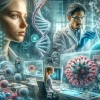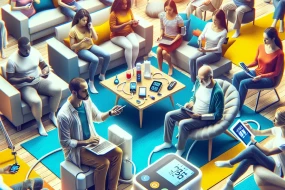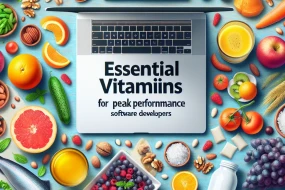
In the rapidly evolving landscape of biotechnology, tech professionals are finding themselves at the forefront of a revolution that promises to redefine healthcare as we know it. From data analytics to software development, the intersection of technology and biotechnology opens a world of opportunities for those equipped with the right skills. This article dives deep into the myriad of possibilities awaiting tech experts in the biotech sector, highlighting real-world examples, potential pitfalls, and the skills needed to thrive.
The Convergence of Technology and Biotechnology
The integration of technology into biotechnology isn't just a passing trend; it's an inevitable evolution. As healthcare data becomes more complex and voluminous, the need for sophisticated technology solutions grows. Tech professionals, with their expertise in data management, AI, and software development, are uniquely positioned to drive innovation in this space. Consider the role of bioinformatics, which uses software tools to understand biological data. This field has become indispensable for genome sequencing and personalized medicine, offering tech experts a chance to make a tangible impact on patient outcomes.
Opportunities in Data Analytics and Machine Learning
Data analytics and machine learning are transforming how we approach healthcare. By analyzing vast datasets, tech professionals can identify patterns and insights that were previously invisible. This has profound implications for disease prediction, patient care, and drug development. For example, machine learning algorithms can predict patient deterioration in hospitals, allowing for preemptive interventions. However, it's crucial for tech experts to avoid common pitfalls, such as overfitting models or ignoring data privacy concerns. Ethical data handling and robust model validation are essential to success in this field.
Software Development in Biotech: Building the Future
Software development is another area where tech professionals can shine in biotechnology. From creating user-friendly interfaces for medical devices to developing secure platforms for telemedicine, the demand for skilled developers is skyrocketing. A common mistake tech professionals make is underestimating the regulatory requirements in healthcare software. Understanding compliance with standards like HIPAA is crucial for developing applications that not only function well but also protect patient data.
Navigating the Regulatory Landscape
The biotech industry is heavily regulated, and for good reason. Ensuring patient safety and data security is paramount. This means tech professionals must familiarize themselves with regulations that govern healthcare technology. Whether it's the FDA's stance on digital health products or GDPR compliance for data handling, understanding these regulations is non-negotiable. Ignorance can lead to costly mistakes and even legal consequences, so continual education in this area is essential.
Cross-Disciplinary Collaboration: The Key to Innovation
Biotechnology thrives on collaboration between disciplines. Tech professionals who can effectively communicate and work alongside biologists, chemists, and healthcare providers will find themselves at a distinct advantage. This cross-disciplinary approach fosters innovation and leads to solutions that might not emerge in siloed environments. However, a common challenge is the language barrier—both literal and figurative—between tech and biotech experts. Bridging this gap requires patience, open-mindedness, and a willingness to learn from others.
The Importance of Continuous Learning
In a field as dynamic as biotechnology, continuous learning is not just beneficial; it's essential. Tech professionals must stay updated with the latest advancements in both technology and biology. Online courses, professional certifications, and workshops can be invaluable for keeping skills sharp. Moreover, engaging with professional communities through conferences and forums can provide insights into emerging trends and technologies. A commitment to lifelong learning will ensure tech experts remain relevant and competitive in this ever-evolving industry.
Real-World Success Stories
Numerous tech professionals have already made significant strides in biotechnology. Consider the case of Tempus, a technology company that uses AI to personalize cancer treatment. By analyzing clinical and molecular data, Tempus provides doctors with actionable insights, improving patient outcomes. Another example is the development of CRISPR technology, which relies heavily on computational tools for gene editing. These stories exemplify how tech expertise can lead to groundbreaking advancements in healthcare, offering inspiration and a roadmap for others in the field.































